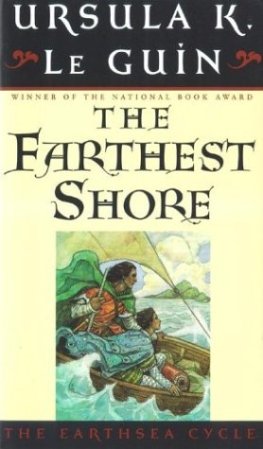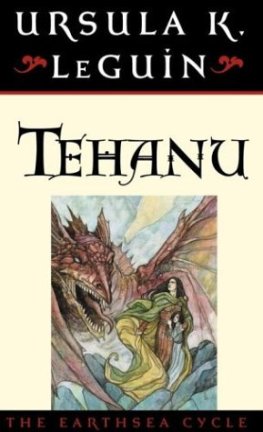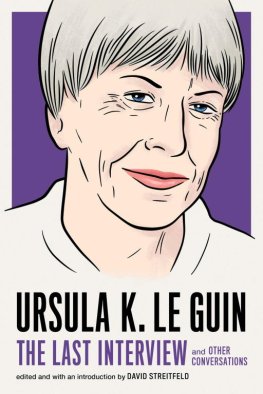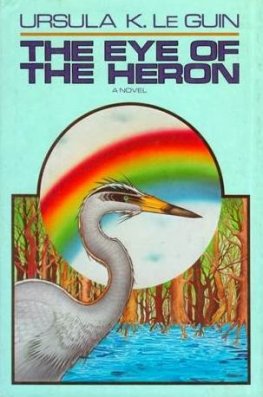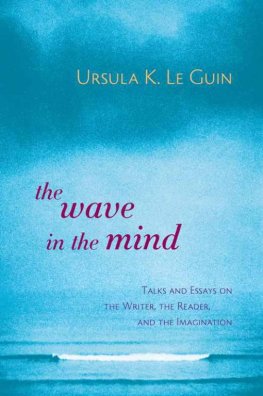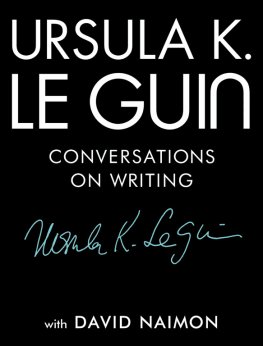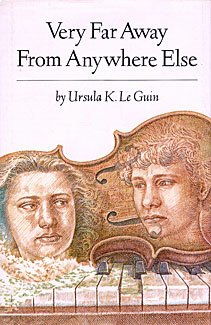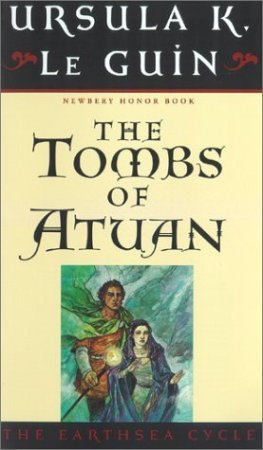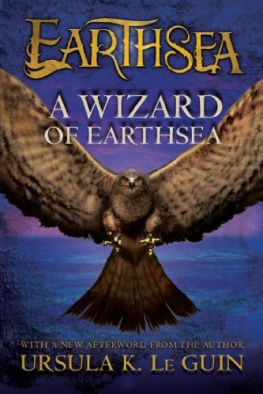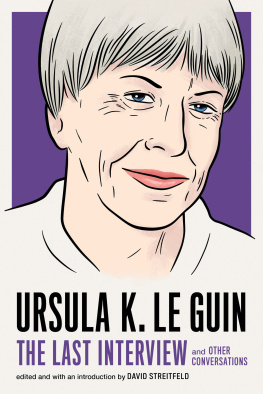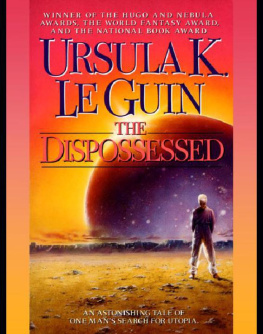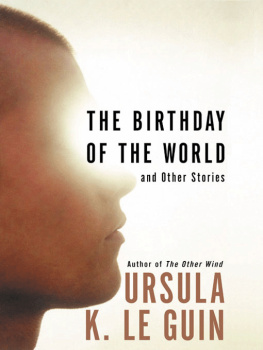Ursula Le Guin - Paradises Lost
Here you can read online Ursula Le Guin - Paradises Lost full text of the book (entire story) in english for free. Download pdf and epub, get meaning, cover and reviews about this ebook. genre: Science fiction. Description of the work, (preface) as well as reviews are available. Best literature library LitArk.com created for fans of good reading and offers a wide selection of genres:
Romance novel
Science fiction
Adventure
Detective
Science
History
Home and family
Prose
Art
Politics
Computer
Non-fiction
Religion
Business
Children
Humor
Choose a favorite category and find really read worthwhile books. Enjoy immersion in the world of imagination, feel the emotions of the characters or learn something new for yourself, make an fascinating discovery.

- Book:Paradises Lost
- Author:
- Genre:
- Rating:4 / 5
- Favourites:Add to favourites
- Your mark:
- 80
- 1
- 2
- 3
- 4
- 5
Paradises Lost: summary, description and annotation
We offer to read an annotation, description, summary or preface (depends on what the author of the book "Paradises Lost" wrote himself). If you haven't found the necessary information about the book — write in the comments, we will try to find it.
Paradises Lost — read online for free the complete book (whole text) full work
Below is the text of the book, divided by pages. System saving the place of the last page read, allows you to conveniently read the book "Paradises Lost" online for free, without having to search again every time where you left off. Put a bookmark, and you can go to the page where you finished reading at any time.
Font size:
Interval:
Bookmark:
Paradises Lost
Ursula K. Le Guin
This shaking keeps me steady. I should know.
What falls away is always. And is near.
I wake to sleep, and take my waking slow.
I learn by going where I have to go.
The blue parts were lots of water, like the hydro tanks only deeper, and the other-colored parts were dirt, like the earth gardens only bigger. Sky was what she couldnt understand. Sky was another ball that fit around the dirtball, Father said, but they couldnt show it in the model globe, because you couldnt see it. It was transparent, like air. It was air. But blue. A ball of air, and it looked blue from underneath, and it was outside the dirtball. Air outside. That was really strange. Was there air inside the dirtball? No, Father said, just earth. You lived on the outside of the dirtball, like evamen doing eva, only you didnt have to wear a suit. You could breathe the blue air, just like you were inside. In nighttime youd see black and stars, like if you were doing eva, Father said, but in daytime youd see only blue. She asked why. Because the light was brighter than the stars, he said. Blue light? No; the star that made it was yellow, but there was so much air it looked blue. She gave up. It was all so hard and so long ago. And it didnt matter.
Of course they would land on some other dirtball, but that wasnt going to happen till she was very old, nearly dead, sixty-five years old. By then, if it mattered, shed understand.
Privative DefinitionAlive in the world are human beings, plants, and bacteria.
The bacteria live in and on the human beings and the plants and the soils and other things, and are alive but not visible. The activity even of great numbers of bacteria is not often visible, or appears to be simply a property of their host. Their life is on another order. Orders, as a rule, cannot perceive one another except with instruments which allow perception of a different scale. With such an instrument one gazes in wonder at the world revealed. But the instrument has not revealed ones larger-order world to that smaller-order world, which continues orderly, undisturbed and unaware, until the drop dries suddenly on the glass slide. Reciprocity is a rare thing.
The smaller-order world revealed here is an austere one. No amoeba oozing along, or graceful paisley-paramecium, or vacuum-cleaning rotifer; no creature larger than bacteria, juddering endlessly under the impacts of molecules.
And only certain bacteria. No molds, no wild yeasts. No virus (down another order). Nothing that causes disease in human beings or in plants. Nothing but the necessary bacteria, the house-cleaners, the digesters, the makers of dirtclean dirt. There is no gangrene in the world, no blood poisoning. No colds in the head, no flu, no measles, no plague, no typhus or typhoid or tuberculosis or AIDS or dengue or cholera or yellow fever or Ebola or syphilis or poliomyelitis or leprosy or bilharzia or herpes, no chickenpox, no cold sores, no shingles. No Lyme disease. No ticks. No malaria. No mosquitoes. No fleas or flies, no roaches or spiders, no weevils or worms. Nothing in the world has more or less than two legs. Nothing has wings. Nothing sucks blood. Nothing hides in tiny crevices, waves tendrils, scuttles into shadows, lays eggs, washes its fur, clicks its mandibles, or turns around three times before it lies down with its nose on its tail. Nothing has a tail. Nothing in the world has tentacles or fins or paws or claws. Nothing in the world soars. Nothing swims. Nothing purrs, barks, growls, roars, chitters, trills, or cries repeatedly two notes, a descending fourth, for three months of the year. There are no months of the year. There is no moon. There is no year. There is no sun. Time is divided into lightcycles, darkcycles, and tendays. Every 365.25 cycles there is a celebration and a number called The Year is changed. This Year is 141. It says so on the schoolroom clock.
The TigerOf course there are pictures of moons and suns and animals, all labelled with names. In the Library on the bookscreens you can watch big things running on all fours over some kind of hairy carpet and the voices say, horses in wyoming, or llamas in peru. Some of the pictures are funny. Some of them you wish you could touch. Some are frightening. Theres one with bright hair all gold and dark, with terrible clear eyes that stare at you without liking you, without knowing you at all. Tiger in zoo, the voice says. Then children are playing with some little kittens that climb on them and the children giggle and the kittens are cute, like dolls or babies, until one of them looks right at you and there are the same eyes, the round, clear eyes that do not know your name.
I am Hsing, Hsing said loudly to the kitten-picture on the bookscreen. The picture turned its head away, and Hsing burst into tears.
Teacher was there, full of comfort and queries. I hate it, I hate it! the five-year-old wailed.
Its only a movie. It cant hurt you. It isnt real, said the twenty-five-year-old.
Only people are real. Only people are alive. Fathers plants are alive, he says so, but people are really alive. People know you. They know your name. They like you. Or if they dont, like Alidas cousins little boy from School Four, you tell them who you are and then they know you.
Im Hsing.
Shing, the little boy said, and she tried to teach him the difference between saying Hsing and saying Shing, but the difference didnt matter unless you were talking Chinese, and it didnt matter anyway, because they were going to play Follow-the-Leader with Rosie and Lena and all the others. And Luis, of course.
If Nothing Is Very Different from You, What Is a Little Different from You Is Very Different From YouLuis was very different from Hsing. For one thing, she had a vulva and he had a penis. As they were comparing the two one day, Luis remarked that he liked the word vulva because it sounded warm and soft and round. And vagina sounded rather grand. But Penis, peee-niss, he said mincingly, pee-piss! It sounds like a little dinky pissy sissy thing. It ought to have a better name. They made up names for it. Bobwob, said Hsing. Gowbondo! said Luis. Bobwob when it was lying down and Gowbondo when it stood up, they decided, aching with laughter. Up, up, Gowbondo! Luis cried, and it raised its head a little from his slender, silky thigh. See, it knows its name! You call it. And she called it, and it answered, although Luis had to help it a little, and they laughed until not only Bobwob-Gowbondo but both of them were limp all over, rolling on the floor, there in Luiss room where they always went after school unless they went to Hsings room.
Putting on ClothesShe looked forward to it forever and couldnt sleep at all the night before, lying awake forever. But there was Father standing there suddenly, wearing his dress-up clothes, black long pants and his white silky kurta. Wake up, sleepyhead, are you going to sleep through your Ceremony? She leaped up from bed in terror, believing him, so that he said at once, seriously, No, no, I was only joking. You have plenty of time. You dont have to get dressed, yet! She saw the joke, but she was too bewildered and excited to laugh. Help me comb my hair! she wailed, tugging her comb into a knot in the thick black tangles. He knelt to help her.
By the time they got to the Temenos her excitement only made everything clearer than usual, bright, distinct. The huge room seemed even bigger than usual. Music was playing, cheery and dancy. Lots and lots of people were coming, naked children, each one with a parent in dress-up clothes, some of them with two parents, many with grandparents, a few with a little naked brother or sister or a big brother or sister in dress-up clothes. Luiss father was there, but he was only wearing workshorts and an old singlet, and she was sorry for Luis. Her mother Jael came through the big crowd of people. Jaels son Joel came with her from Quad Four, and both of them were wearing really, really dress-up clothes. Jaels had red zigzags and sparkles painted on, and Joels shirt was purple with a gold zipper. They hugged and kissed, and Jael gave Father a package and said For later, and Hsing knew what was in it, but didnt say anything. Father was hiding his package in one hand behind his back and she knew what was in it too.
Font size:
Interval:
Bookmark:
Similar books «Paradises Lost»
Look at similar books to Paradises Lost. We have selected literature similar in name and meaning in the hope of providing readers with more options to find new, interesting, not yet read works.
Discussion, reviews of the book Paradises Lost and just readers' own opinions. Leave your comments, write what you think about the work, its meaning or the main characters. Specify what exactly you liked and what you didn't like, and why you think so.

